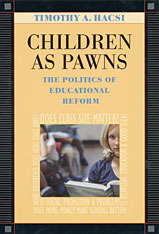

Head Start. Bilingual education. Small class size. Social promotion. School funding. Virtually every school system in America has had to face these issues over the past thirty years. Advocates and dissenters have declared confidently that "the research" is on their side. But is it?
In the first book to bring together the recent history of educational policy and politics with the research evidence, Timothy Hacsi presents the illuminating, often-forgotten stories of these five controversial topics. He sifts through the complicated evaluation research literature and compares the policies that have been adopted to the best evidence about what actually works. He lucidly explains what the major studies show, what they don't, and how they have been misunderstood and misrepresented. Hacsi shows how rarely educational policies are based on solid research evidence, and how programs that sound plausible simply do not satisfy the complex needs of real children.

After the May Fourth Incident, John Dewey’s followers in China assumed the leadership of an important group of intellectuals who were largely veterans of the New Culture movement. The Chinese Communist movement had its inception in the same two years Dewey lectured in China (1919–1921); Dewey’s followers pitted their “liberalism” against this new radical alternative, in arguments that proved to be harbingers of a thirty-year conflict in Chinese politics.
The Dewey Experiment in China critically analyzes the careers and writings of John Dewey’s followers through the 1920s—particularly Kuo Ping-wen, Chiang Meng-lin, and T’ao Hsing-chih—as they attempted to implement Dewey’s political reform ideas and his progressive educational principles. The “new education” reform movement was spearheaded by Deweyites and directed a national-level educational reform effort for many years following World War I. Many of Dewey’s ideas that seemed most progressive in the United States are shown to be surprisingly conservative for China. The promise of progress implicit in problem-solving based upon conflicts in actual, concrete social conditions, as Dewey formulated it, deluded its proponents with a false hope of efficacy. The issue of political power was not adequately addressed. In education, unspoken assumptions about progressive reform in the United States proved to be absent in China.
The most dedicated Deweyites were forced to “turn Dewey on his head” by the end of the 1920s. What appeared to Dewey to be democracy through interest-group bartering among nations was often understood in “Third World” China as Big Power politics and the exploitation of the weak. The Dewey Experiment in China reflects, therefore, not only upon Dewey’s own thought but upon the fragility of many American ideas assumed to have been applicable again after World War II in China and Southeast Asia.

In this process of reform, neither the administration of schools nor school content was really decentralized from the Ministry of Education, nor did students gain equality of educationaly opportunity or better schooling outcomes. These failures of the post-welfare model are due partly to Chile’s political and economic problems of the era, but are also evidence of flaws at its core, at least where education is concerned.
The study presents data for an original survey of 726 households in Greater Santiago that finds more evidence for social and economic stratification among Chilean schools than past analyses have shown. Gauri finds that information about school quality, a sense of entitlement, and the use of specific search techniques increase the odds that a child attends a school with high achievement scores. Gauri offers some insights as he supports the criticism that market forces might exacerbate inequalities without necessarily generating clear gains in academic achievement. In the new system, many parents continued to be ill-informed about differences among schools, nonacademic factors played a major role in school selection, schools appeared to use entrance exams to practice a form of “creaming,” and parental wealth was a strong determinant of whether families were willing and able to take full advantage of choice programs.
These are extremely timely findings, especially in light of the current debate over school choice and vouchers in the United States. Because the United States has little experience in school choice, School Choice in Chile presents a convincing and necessary report on an almost twenty-year-old experience with information from which all nations can learn. Parents, policy analysts in education and social welfare, as well as those studying political science, public policy, and education, will find it extremely useful.

Three critiques form this postmodern approach to teacher research. An epistemological critique considers issues of power in the relationship of university researchers to teachers. A sociopolitical critique examines the relationships that a teacher may have to the research process. A professional critique argues for staff development programs that encourage teachers to take greater responsibility for curriculum and instruction and for institutional structures that support teacher research as a professional activity.
READERS
Browse our collection.
PUBLISHERS
See BiblioVault's publisher services.
STUDENT SERVICES
Files for college accessibility offices.
UChicago Accessibility Resources
home | accessibility | search | about | contact us
BiblioVault ® 2001 - 2024
The University of Chicago Press









